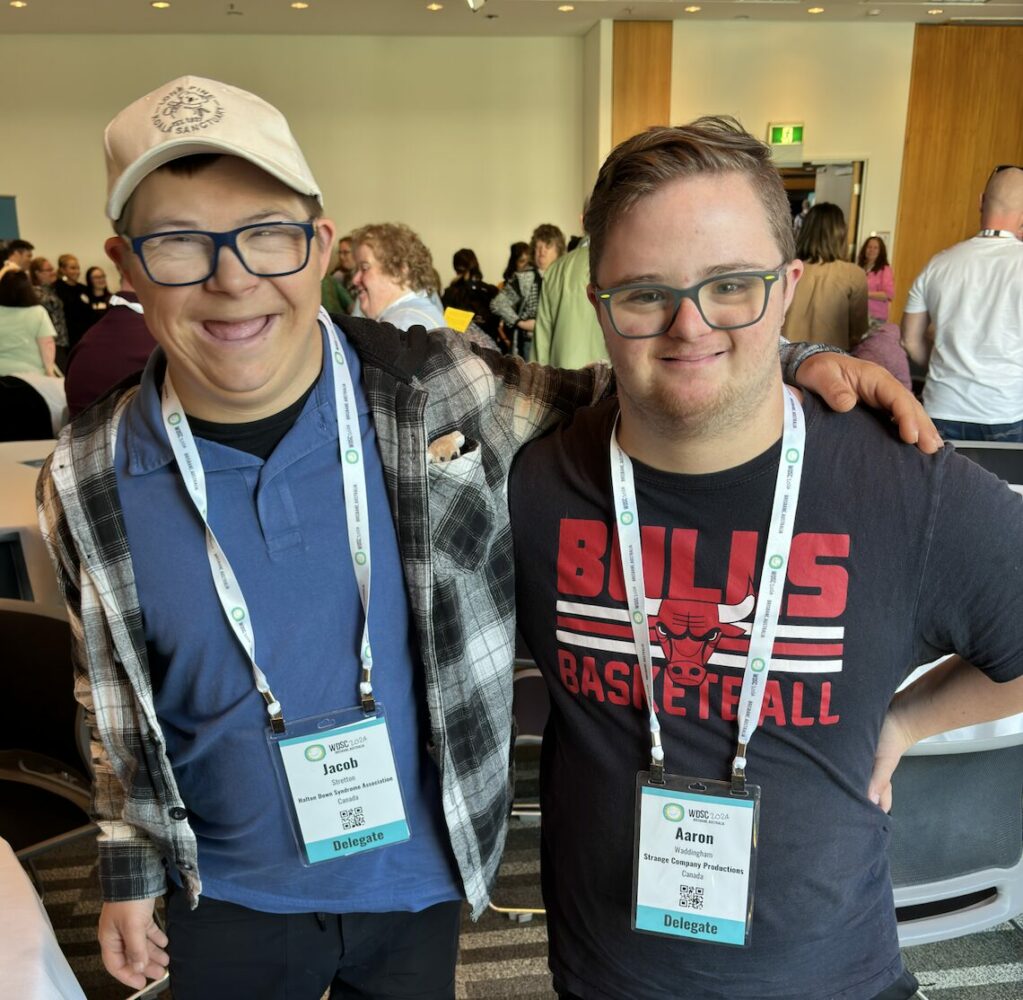Lessons from the World Down Syndrome Congress

Brisbane, July 2024
By Aaron Waddingham and Sue Robins
Introduction
This is an article co-written by Aaron Waddingham and Sue Robins about their take aways from the World Down Syndrome Congress in Brisbane in July 2024. Aaron’s contributions are in italics. Aaron and Sue are grateful to the Canada Council’s Arts Abroad program, which gave Aaron an emerging artist grant to travel to Australia to network and learn.
About the Congress
“Dancing was my favourite part about the Congress.”
The World Down Syndrome Congress happens every three years. It is cool to see people with Down syndrome from all over the world and these events offer an instant feeling of community. The Brisbane conference was the 15th Congress and had 45 countries represented. This year’s theme was “Together we can: Celebrate diversity and inclusion.”
Topics included health care, mental health, employment, and self-advocacy. Aaron chaired a session with well-known physician Dr. Brian Skotko. He also introduced his short film Chicken and participated afterwards in a panel about inclusive filmmaking.
Lessons Learned
Aaron attended sessions from 9 am to 3 pm every day. He often dumped me to go to lectures and workshops on his own.
“Do you want to take a break?” I asked him on Day 2.
“Mom, I am learning,” he said, rolling his eyes and taking off to the next workshop.
Dr. Brian Skotko opened the conference by presenting research findings about prenatal testing, which led to a necessary chat with Aaron about prenatal testing and termination. (I’ve managed to avoid talking about this hard topic with him. But it caught up with me in Brisbane).
Some of Dr. Skotko’s main points included the need to collect statistics about the number of people with Ds (“if you don’t count, you don’t matter.”). Canada doesn’t collect termination data or numbers of people with Down syndrome, so they weren’t included in the study. This lack of data collection is an issue on its own.
Dr. Skotko emphasized that it is important for health professionals to deliver the diagnosis of Down syndrome in a humane way because it is a ‘flashbulb moment’ for families. Indeed, we never forget when that news is shared.
I scribbled down many quotes over the three days:
“Down syndrome people should be the chairs of Down syndrome organizations.”
“Families of people with Down syndrome want admiration. They don’t want pity.” – author Patricia Bauer
“The fight for rights for people with disabilities is the last civil rights battle.” – Angus Graham, talking about Australia’s Disability Royal Commission findings.
“Get a few families together and the world better watch out!” – Bridget Snedden, President Down Syndrome International
Congress Sessions
“I liked seeing people doing talents, like dancing and choreography and acting.”
We attended film screenings and a panel hosted by Bus Stop Films, which is an Australian organization that offers accessible film programs for disabled people. Bus Stop is a shining example of creative employment opportunities in the arts. It reminded me that Canada could learn from innovations from other countries.
Two Australian actors with Down syndrome, Gerard O’Dwyer and Olivia Hargroder spoke passionately about how being involved with film projects meant the world to them. They expressed how important it was, ‘to be validated by someone just hearing us.’
The self-advocate sessions were my favourite. It was there I heard the unfiltered truth, directly from people with Down syndrome:
“This is me. And I can. We all can.”
“We don’t want special treatment; we want equal treatment.”
“My mom was afraid of letting me go to the wide world. All moms are like that.”
Takeaways
Aaron’s take away from the Congress was from a conversation with a teacher who had given a talk about reading. He patiently waited in line to speak with her afterwards and then expressed that he was still thinking about a bully he had way back in Grade 1. (I had not realized this experience had affected him so much).
Afterwards, he came out with this wisdom:
“I’ve allowed this person too much power. I have to wash this person’s power off of me.”
This nugget has many applications in life, whether you have Down syndrome or not.
My own take away from Brisbane was a clear reminder that Aaron is a life-long learner, and I should seek out opportunities for him to spend time with other self-advocates and learn about Down syndrome.
“I’m learning mom. I like learning about Down syndrome. It is good for people to learn to understand.”
The next World Down Syndrome Congress is in Argentina in 2027. I don’t know if we will have funding to go, but in the meantime, there are conferences closer to home – including Down Syndrome BC’s local 3/21 Summit and NDSS’s Adult Summit.
Even though Aaron is an adult, and our family has been immersed in the Down syndrome community for his whole life, the Congress was a humble reminder that I’m not an expert on Down syndrome – people with Down syndrome are. Attending a conference like the World Down Syndrome Congress was invaluable, as it was an opportunity for our family to keep growing and learning together.
